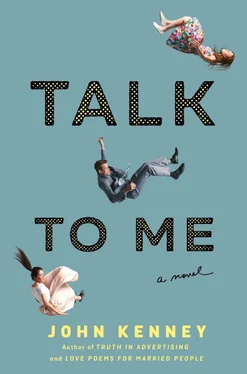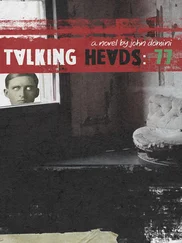One night, in the seemingly perfect home in the quaint town, the European cars safely in the driveway and the doors locked and the fireplace going and the house cleaned by immigrants and the good Bordeaux breathing and her iPod and MacBook Pro blinking and her squash outfit washed and folded and her backpack ready and her trip to France for the summer with friends planned, she screamed again and again and the house was a terror zone and Claire was trying to calm her but occasionally shouting herself and Ted trying but out of gas, out of patience, images of his own upbringing in Woonsocket, his own parents, how hard they worked and provided, never complaining, and here was his own daughter, his mother’s granddaughter… screaming I hate you I hate you I hate you …
“Oh yeah?” Ted said, too loud. “Well, guess what, I hate you, too.”
And the house went quiet. And Claire put her hands over her face. And Franny stared, mouth hanging open. Because the therapist was right. She hated herself and feared she wasn’t lovable. So she pushed and pushed and tried to make it come true. And she knew, in that moment—even if it was just a moment—that he meant it.
• • •
Ted tried. Until he didn’t. He started working later, traveling more. Often, by the time the broadcast was over, after they’d prep for the next day, a dinner or drinks, he’d opt to stay in the city at an apartment the network rented for him.
But there were many nights when he simply didn’t want to go home. When he didn’t want to deal with Franny, fight with Claire. Where he simply wanted to retreat to the apartment, change his clothes, wash his face, and open a cold bottle of beer. He’d watch a Rangers game. Make a bologna sandwich. He didn’t know what to do with her. So he did nothing. He thought that would be the least harmful thing.
• • •
Ted missed all of the meetings with the therapist. That’s how Franny saw it. In truth, Claire and Ted had met with the therapist, who had suggested that it might be more productive if Ted not be in the family sessions. Franny’s anger was so complete that she would likely shut down if Ted were in the room.
Her father’s lack of attention was a gift. It prepared her for her teenage years, the fumbling emotions of other kids. She may have been a mess inside, but she learned to maintain a steely face to teachers, bullies, opponents on the court.
There was talk of Bedford High School but Claire had her sights set on New Canaan Country Day School or Greenwich Academy. Ted wondered aloud why they were paying $42,800 a year in property taxes for a school system they didn’t use. This struck Claire as insensitive and Franny as typical of her father.
Franny’s friend Emma Beckett had started at Northfield Mount Hermon the year before and loved it. Claire was against it, felt she wanted to keep Franny close. It was Ted, to Franny’s surprise and then dismay, who thought it a good idea. Franny’s main goal in life was to get her father’s attention by doing things he didn’t want her to do. She questioned any idea he agreed with. But leaving was too strong a pull. She had to get out of the house, to get away from her parents, whose only desire was to help her.
• • •
She hated it. Hated every minute of it. She was profoundly homesick but couldn’t bring herself to admit that. She discovered the great joys of smoking pot and music she’d never listened to before, the Grateful Dead and the Jam and the Smiths and Simon & Garfunkel and when it was very late and her roommate was asleep she would put her headphones on and listen to Vince Guaraldi’s version of “Moon River” and cry herself to sleep.
• • •
Junior year. Scott Landau. His great-grandfather had started Stride Rite shoes. Scott played hockey and acted like a person who knew that money could buy you out of anything. He turned Franny on to cocaine. Just once in a while. Nothing serious. A few lines. Sometimes more. Also Ecstasy, which Franny thought was quite pleasant. Again, not all the time. Not, like, a problem or anything. Special occasions. All-night drives to New York City and a room at the Bowery Hotel or Soho House, where his father was a member. Friends of Duncan’s from Dalton and Horace Mann, rich kids, parties at absent parents’ apartments on Park Avenue, in the Hamptons. It felt like touring with the Rolling Stones. It felt too good to let it stop. The dopamine surge, warm and happy. The serotonin kick that eliminated the need for food or sleep, everything and everyone alive and sexual and there for the taking. The downside being the fall after it wore off. Nausea, chills, headache. The feelings of paranoia, distrust of people, and fear of your surroundings. Though at this particular time in her life, she felt that way most days stone sober.
She woke up vomiting more. She missed Work-Job. Everyone at Northfield had a Work-Job and you couldn’t miss it. It was the one decent thing her roommate did for her. Lie and punch her in on those mornings she couldn’t get in, after a long night, those bitterly cold western Massachusetts winter mornings; when to have to make pan after pan of scrambled eggs, pancakes, bacon, was out of the question. Lauren someone. She was clingy and a little weird but she seemed to care about Franny. Franny had woken up one night to find Lauren staring at her.
One night… no, more than one night… she passed out, waking in a half-conscious state, with Duncan on top of her, one of Duncan’s friends laughing.
• • •
Would Franny Grayson come to the reunion?
These thoughts crossed Lauren’s mind as she crafted a witty invite for the reunion for the class of 2006 from the Northfield Mount Hermon School. She knew from Facebook and Instagram that Franny worked at some kind of website.
As for Lauren, she was a social worker who helped run a not-for-profit clinic in Greenfield, Massachusetts, for families in crisis. She also took an Armenian folk dancing class every other Tuesday evening in the basement of the Armenian church, though she herself was not Armenian but a New York Jew, a line that always got her a laugh at parties. She ran road races and 5Ks in the foothills of the Berkshires and once did a Tough Mudder with a group of friends to raise money for the clinic.
She had loved NMH. Loved the clean life, the outdoors and the sports, the healthy people and open attitude, the acceptance. Sure, there were cliques but that was any school. After Harvard (Divinity, honors), she returned to Northfield to work as a residence counselor. The time there, both as a student and as a counselor, had formed her. She’d found a sense of place and belonging. Which was why she sat in front of her computer in her office at 7:30 on a Tuesday evening in March. It was cold out, the last hints of light in the western sky. Ahead of her an evening alone at home with Peepers, her cat, and American Idol and a book and possibly a burrito of her own making. On paper that might seem lonely to some. Not Lauren. Though with the cursor blinking at her, taunting her, it did, for a moment, seem a bit sad.
No. No, it wasn’t sad. I’m doing fine, she thought. I have my books here and my motivational apps and my stuffed animals. Yes, some of my colleagues make sarcastic comments. Yes, I try too hard sometimes, come on too strong, get asked by people to give them space. If that’s the worst you can say about a person then I’d say that person is doing all right. And yes, maybe a person sits in their car at night and watches a colleague through their window. Just to see them, to feel connected to them, to know what their life is like. A few times. A half a dozen times. Maybe more. People do that. Don’t they?
Читать дальше












